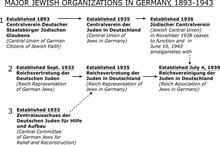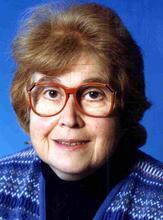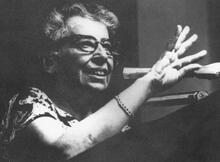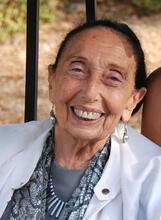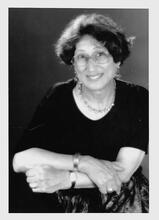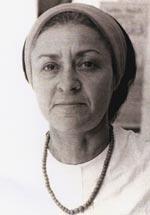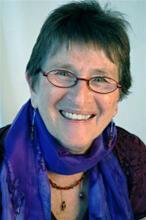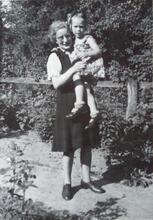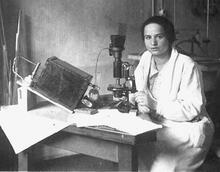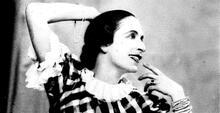Nelly Neumann
Nelly Neumann completed her doctorate in synthetic geometry in 1909 at Breslau University, making her one of the first women in Germany to obtain such a degree. After moving to Göttingen with her husband, she attended lectures and worked in the career-guidance office for female students at the university there. In 1918 Neumann became a secondary school teacher, in which capacity she led a joint venture combining mathematics and philosophy. She was also involved in peace activities through the German Society of Peace. Although she had converted to Protestantism and was active in Bible study groups, Neumann was still considered Jewish by the Nationalist Socialist definition. She was deported to the East in 1941 and murdered in Minsk the following year.
Nelly Neumann, who worked in synthetic geometry, was among the first women to obtain doctorates in mathematics at a German university.
Early Life
She was born on January 3, 1886, in Breslau (today Wroclaw in Poland, then a Prussian city), to the judicial officer (Justizrat) Max and Sophie (Deutsch) Neumann. Her mother died when Nelly was two years old. As a result, she lived alone with her father and her maternal grandmother, a difficult woman. After ten years (1892–1901) in a private school (Miss Anna Malberg’s “Höhere Töchterschule”), she attended girls’ grammar courses and graduated at a boys’ school (König-Wilhelm-Gymnasium) in 1905. She was very interested in mathematics, but the girls’ schools did not enable her to take the boys’ school-leaving exam. Her father therefore promoted her mathematical talent by arranging private lessons in mathematics given by Richard Courant (1888–1972) who was her junior by two years and the only young person whom her grandmother would allow to come to her home. Though his financial situation was more difficult than hers, he later became a famous mathematician at the Göttingen University and, after his emigration to the United States, founded the famous Courant Institute in New York.
Doctoral Studies
Neumann and Courant attended Breslau University in 1905 and for one semester in the summer 1907, Zürich University and Eidgenössische Technische Hochschule. Courant then decided to continue his studies at the Göttingen University, then the international center of mathematics. In 1910, he wrote his doctoral thesis with one of the greatest mathematicians, David Hilbert (1862–1943). Nelly Neumann went back to Breslau and completed her thesis in 1909, under the direction of the synthetic geometer Rudolf Sturm (1841–1919). The oral viva took place in mathematics with Sturm and Jacob Rosanes (1842–1922) as examiners, physics with Ernst Pringsheim (1859–1917), and philosophy with Richard Hönigwald (1857–1947), on July 14, 1909. On November 20, 1909, she delivered a lecture “Über die Euklidische Propotionslehre und neuere an sie anschliessende Untersuchungen” and obtained her doctoral degree. While Courant from the first intended to become a scientist, Neumann considered a position as a schoolteacher. Though she wrote to Courant that she could get a post-doctoral position at the University of Breslau, she did not take it. On May 5, 1911, she took her degree as a teacher for mathematics, physics, and philosophy. She was a very thoughtful woman with an interest in questions of ethics, which she shared with Courant, to whom she became engaged at the end of 1911.
Life in Göttingen & Teaching Career
After Courant received his post- doctoral degree at Göttingen University, they married in the summer of 1912 and moved into a flat in Göttingen. Disliking housework and feeling lonely, she arranged for Richard Courant’s cousin Edith Stein (who later became a famous philosopher, converted to Catholicism, and in 1942 died in Auschwitz) and her friend, the mathematician Rose Guttmann, to come to Göttingen to continue their studies. Together with them, Nelly attended lectures at the university. In addition, she worked in a career-guidance office for women students, which was founded by the Association of Women’s Education and Women’s Study (Frauenbildung–Frauenstudium Verein). After the outbreak of World War I, it was decided that Nelly should spend the war years with her father in Breslau. However, in 1915, since there was a lack of teachers, Nelly planned to take a teaching position. On February 16, 1916, the couple divorced, and Nelly resumed her maiden name.
On April 1, 1918, Nelly became a probationary secondary-school teacher after completing her second state examination, and on April 1, 1919, she became a secondary-school teacher at a girls’ high school in Essen. Her pupils later described her as a careful, liberal and fair teacher, full of enthusiasm for mathematics, physics, and chemistry, all of which she taught. She combined mathematics with philosophy, leading a joint venture, in which she spoke with pupils on mathematical and philosophical questions. As a member of the German Society of Peace (Deutsche Friedensgesellschaft), founded by Bertha von Suttner in 1892, she was involved in peace activities. The society, which established the first pacifist program in Germany, was dissolved by the National Socialists.
Religious Affiliation
A good pianist, Nelly Neumann was interested in music and particularly liked Mozart. She also cultivated religious interests, especially in a circle of the Protestant minister Graeber in Essen. When she wrote her curriculum vitae in 1909, she gave her religion as Jewish, although, together with Courant, she had become a Protestant.
On September 27, 1933, Neumann was dismissed because, according to the National Socialist definition, she was Jewish. She was supported by friends; pupils came to see her until 1941, and she participated in Bible study organized by Graeber, who had also lost his position. This Bible study took place in private homes, including that of Gustav Heinemann, who later became president of Germany. On November 10, 1941, she was deported to the East and murdered in Minsk in 1942.
Work by Nelly Neumann
Ueber das Flächennetz 2. Ordnung und seine korrelative Beziehung auf einen Strahlenbündel. Inaugural-Dissertation, Faculty of Philosophy at the University of Breslau. Breslau: 1909.
Archives of the University of Wroclaw, Promotionsakte Nelly Neumann.
Rohsa, Erich. “Nelli Neumann fand die Mathematik einfacher als den Haushalt (Studienzeit in Göttingen, III).” Göttinger Monatsblätter, November 5–7 (1983).
Schröter, Hermann. Geschichte und Schicksal der Essener Juden. Gedenkbuch für die jüdischen Mitbürger der Stadt Essen. Essen: Stadt Essen, 1980.
Stein, Edith. “Aus dem Leben einer jüdischen Familie.” Werke, Vol. VII. Freiburg: Herder, 1965.
Wielandt, Ingrid. “Ein Lebens- und Leidensweg. Das Schicksal der jüdischen Lehrerin Nelli Neumann.” Festschrift, 125 Jahre Luisenschule 1866–1991. Essen: N.p., 1991.

